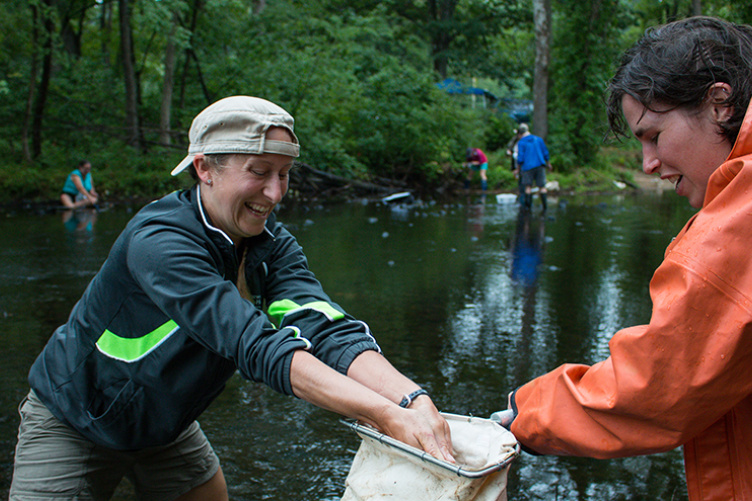
Beth Theriault and UNH Cooperative Extension's science literacy team program coordinator, Megan Glenn, collect aquatic organisms during STEM docents training in Manchester.
After an unbroken string of unusually hot, dry days, the skies finally opened on Wednesday, Aug. 10, drenching the 12 STEM docents who had gathered at the Piscataquog River in Manchester for the second day of their program training.
Undaunted by the challenge of working in the wet weather, the docents waded into the water to collect organisms as a part of the “Stream Safari” curriculum, which encourages youth to explore local streams by examining the inhabitants and investigating the water quality based on the presence of particular aquatic organisms.
As they diligently went about their task, each new docent demonstrated the skills they are hoping to inspire among the youth they’ll be working with come September: working together as a group, asking scientific questions, thinking critically, problem solving, interpreting data and, perhaps most importantly, simply rolling up their proverbial sleeves (or in this case, pant legs), diving in and having fun.
“Stream Safari brings kids to a stream and tells them to muck around and see what they can find,” says Beth Theriault, a stay-at-home mom who taught health and STEM at Garrison Elementary School in Dover for eight years. “Most kids are excited when they are told to muck around. This hands-on learning is an amazing experience of connecting the kids with the natural world around them. The knowledge they learn is something they can use the rest of their life, whether it's the kids coming to a stream with their parents or in the future with their own kids.”
According to a report by the New Hampshire Charitable Foundation, New Hampshire currently has an insufficiently trained STEM workforce. As a result, it is becoming increasingly difficult for businesses to find and hire people with the skills they need. This news was a contributing factor to the creation of Cooperative Extension’s STEM Docent program, whose goal is to expose young learners to science, technology, engineering and math in ways that both educate and inspire them to pursue a STEM career.
“Many students don't know how to deal with failure. In STEM we specifically talk about how failure can be positive and is a learning experience. I think STEM docents’ inquiry approach can show students that failure isn’t an end — it’s an opportunity.”
In the STEM Docents program, each new cohort of docents receives in-depth and ongoing training on inquiry-based, Next Generation Science Standards-aligned curriculum modules and instruction on how to engage youth in multi-day lessons in classrooms and out-of-school programs. Teachers and education professionals can also become trained to integrate these STEM curricula modules in their classrooms.
“Through my involvement in the STEM Docents program, I hope to provide children with a positive experience with the practical sciences,” says Eric Swanson, an engineer at Dyn, a cloud-based internet performance management company in Manchester, New Hampshire, and member of the National Association of Rocketry. “I plan to use the ‘guide on the side’ teaching approach to give the students enough materials and basic instructions, then get out of the way and let them figure it out, then reinforce their abilities by sharing their successes and struggles as a group.”
After the outdoors portion of their training, the docents convened at UNH Manchester for classroom instruction focused on inquiry-based science, followed by an engineering project modeling this approach to learning science. Their assignment? Learn a curriculum that challenges students to explore the laws of force and motion. Called “mousetrap cars,” the module involves the design, build, test and redesign of cars powered by standard mousetraps and covers problem solving, design and construction and the exploration of force, motion and kinetic energy.
“I’m looking forward to the chaos and unpredictability that comes with giving anyone, but especially children, and open-ended task to complete,” says Swanson. “I look forward to being surprised by their ingenuity and seeing problems and solutions that I never would have thought of myself. Then giving those students the opportunity to share their ideas and grow in confidence.”
Not only do STEM projects like mousetrap cars provide young learners with the chance to work together to solve a problem, it also gives them a chance to fail and learn from their mistakes, which is an integral part of STEM.
“Many students don't know how to deal with failure,” says Theriault. “In STEM we specifically talk about how failure can be positive and is a learning experience. I think STEM docents’ inquiry approach can show students that failure isn’t an end — it’s an opportunity.”
For Swanson and Theriault, the success of the STEM Docents program rests on one thing — the kids. Both would like to see their students excited about the subject matter, clamor for more and experience a surge in self-confidence as a result of what they’re learning.
“It doesn't matter if the kids were able to correctly ID their macro-invertebrates or make a car that works,” says Theriault. “What matters is: What did they take away from the experience? How did they feel about themselves during and after the program? Would they be willing to do something like this again? We want kids to be invested and want more.”
-
Written By:
Sarah Schaier | College of Life Sciences and Agriculture

















































